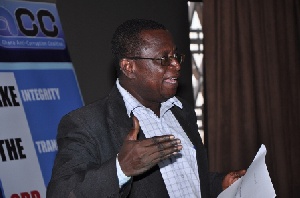The ‘No Verification No Vote’ – NVNV – policy implemented by the Electoral Commission in the 2012 elections created a lot of problems for peasant farmers and fishermen in the country, Dr Kwesi Jonah of the Institute of Democratic Governance (IDEG) has said.
The NVNV was agreed by all the political parties with the EC as a means of ensuring that voters will not cast their ballot for more than once.
However, the biometric system of verification could not capture the biometric data of some people whose fingerprints had worn out as a result of trauma.
The NVNV policy is one of the many reforms suggested for review by various Civil Society Groups and political parties following the 2012 election review case at the Supreme Court.
The Electoral Commission (EC), last week announced a 10-member committee to examine all proposals it received for changes to the country’s electoral process.
The committee, chaired by a Deputy Chairperson of the EC, Mrs Georgina Opoku Amankwaa, will, among other issues, examine the principle of “no verification, no vote” as it currently pertains in the country’s election law.
EC Chairman Dr Kwadwo Afari-Gyan, recently suggested to the Committee to critically examine the NVNV policy as the nation goes into another general elections in 2016.
Speaking to Kafui Dey on Morning Starr Monday January 23, 2015, Dr Jonah said such examination of the policy was necessary because it created a lot of problems for farmers, in particular.
“I received so many calls from the northern part of the country of people who were not able to vote. They went to wash their hands with coca cola, some washed their hands with petrol, some washed their hands with kerosene, those who were lucky, before the machine could capture them. I think it must be examined again,” he said.
Other members of the committee are: Mrs Rebecca Kabukie Adjalo and Mr Christian Owusu-Parry, both from the EC; Mr Johnson Asiedu-Nketia, General Secretary of the National Democratic Congress (NDC); Mr Peter Mac Manu, a former Chairman of the New Patriotic Party (NPP); Mr James Kwabena Bomfeh, the Director of Elections of the Convention People’s Party (CPP) and Mr Anin-Kofi Addo, the founder and Chairman of the Yes People’s Party.
The rest of the members are: Mr Kwesi Jonah, a Senior Research Fellow at Institute for Democratic Governance (IDEG); Dr Ransford Gyampoh, a Research Fellow at Institute of Economic Affairs (IEA) and Dr Franklin Oduro, the Head of Research and Programmes at the Centre for Democratic Development (CDD).
The committee is to examine all the proposals for electoral reforms submitted to the EC embodied in the publication entitled “Proposals for Electoral Reform.”
It is mandated to separate the proposals into ones that require changes into existing laws, rules and regulations and those that require changes to existing administrative procedures.
The committee is also expected to determine which proposals are worthy of adoption and indicate the form in which each change to be adopted is to be incorporated into the electoral system.
It is to submit a report on its work to the EC within three months.
General News of Monday, 26 January 2015
Source: starrfmonline.com

















